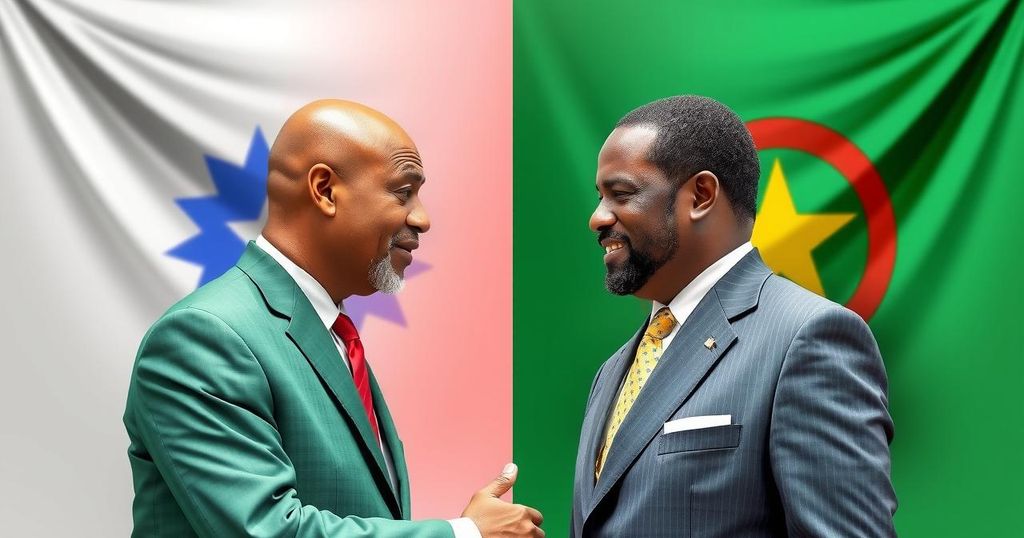Somalia and Ethiopia Restore Diplomatic Relations After Year-Long Rift

Somalia and Ethiopia have announced the restoration of full diplomatic relations, ending a year-long rift exacerbated by Ethiopia’s agreement with Somaliland. During Somali President Hassan Sheikh Mohamud’s visit to Ethiopia, both leaders committed to strengthening bilateral cooperation particularly in security and trade. However, significant issues, including Ethiopia’s maritime access and the status of Somaliland, remain unresolved amidst persistent regional tensions.
On January 11, Somalia and Ethiopia announced the resumption of full diplomatic relations, effectively ending a year-long diplomatic rift that had contributed to instability in the Horn of Africa. This significant development arose during Somali President Hassan Sheikh Mohamud’s visit to Ethiopia, during which he and Ethiopian Prime Minister Abiy Ahmed affirmed their commitment to restoring bilateral relations through a joint statement.
The diplomatic fallout stemmed from Ethiopia’s agreement with Somaliland, Somalia’s breakaway region, which reportedly included recognition of Somaliland’s independence in exchange for access to a Red Sea port and a military base. This controversial deal prompted Somalia to expel the Ethiopian ambassador last April and sever ties. The recent peace agreement, mediated by Turkey, facilitated this reconciliation, with both leaders highlighting their dedication to maintaining a relationship rooted in friendship and solidarity.
Additionally, during their discussions, Mohamud and Abiy focused on enhancing trade and security collaboration, particularly in countering extremist militant threats in the region. Nevertheless, key issues remain unresolved, such as Ethiopia’s potential access to the sea; while Turkish President Recep Tayyip Erdogan previously indicated some form of access would be granted, specific details are still unclear. Moreover, the fate of Ethiopia’s agreement with Somaliland remains uncertain.
Regional tensions linger, as evidenced by a meeting in Cairo on the eve of Mohamud’s visit, where Somalia’s Foreign Minister Ahmed Moalim Fiqi met with his Egyptian and Eritrean counterparts. The Egyptian Foreign Minister, Badr Abdelatty, emphasized, “The Red Sea and its security is subject only to the will of the countries on its coast, and it is absolutely unacceptable for any country not bordering the Red Sea to have a presence, whether military, naval, or otherwise.” Since October, Egypt, Eritrea, and Somalia have formed a regional alliance, further consolidating their resistance to Ethiopia’s aims. Egyptian troops have also joined the African Union Support and Stabilisation Mission in Somalia (AUSSOM) to combat Somali Islamist insurgents effectively.
The restoration of diplomatic ties between Somalia and Ethiopia marks a significant shift in the geopolitical dynamics of the Horn of Africa. Previously strained relations stemmed from Ethiopia’s controversial recognition of Somaliland’s independence, a development that aggravated tensions between the two nations. The Al-Queda-affiliated Al-Shabaab remains a persistent threat in the region, necessitating cooperation between Somalia and Ethiopia in terms of security. Efforts by Turkey to mediate peace have been critical in resolving the disputes, allowing for renewed discussions on trade and security cooperation. The region remains volatile with external influences at play, as evidenced by Egypt’s emphasis on controlling Red Sea security against perceived Ethiopian expansionism.
The restoration of diplomatic relations between Somalia and Ethiopia signifies a critical step towards stabilizing the Horn of Africa. Although the leaders have recommitted to enhancing ties, unresolved issues regarding Ethiopia’s access to maritime routes and the situation concerning Somaliland remain. The intricate balance of power in the region continues to be challenged by various alliances and tensions, revealing the complex geopolitical landscape that requires ongoing attention and dialogue.
Original Source: www.firstpost.com








